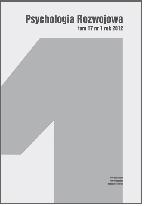Psychologiczne i społeczne konsekwencje ewolucyjnego konfliktu rodzice–potomstwo
Care of the self and human development
Author(s): Andrzej ŁukasikSubject(s): Psychology
Published by: Wydawnictwo Uniwersytetu Jagiellońskiego
Keywords: cooperative breeding; evolutionary psychology; parent–offspring conflict theory; sibling rivalry
Summary/Abstract: Trivers (1974) argued that offspring demand much more parental investment than parents want to give. This conflict of interest stems from a genetic conflict. Parents are genetically equally related to all of their offspring (the coefficient of relatedness r = 0.5; children share 50% genes of each of parents) and, for the parents, they present the same value as the “vehicle” of their genes. For this reason, parents are selected to balance investment among their offspring. For the offspring, it is a different standpoint: for each “full” sibling (r = 0.5) its value is twice as much to the other sibling (because it has 100% of its own genes, and the second sibling shares only 50% of its genes), and its value is fourfold higher than the value of a half-sibling (r = 0.25). The “selfish” children, driven by their own genetic interest, try to obtain more parental investment than their parents intend to provide, even at their siblings’ disadvantage. In this situation, a parent–offspring conflict arises that concerns the distribution of parental investment, and what is important, one can expect a sibling rivalry for these resources. In this paper the social and psychological consequences of parent – offspring conflict are discussed: i.a. infanticide, mate preference conflict, sibling rivalry and allomothering as a way in which parent–offspring can be reduced.
Journal: Psychologia Rozwojowa
- Issue Year: 17/2012
- Issue No: 1
- Page Range: 49-64
- Page Count: 16
- Language: Polish

